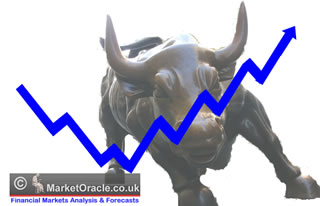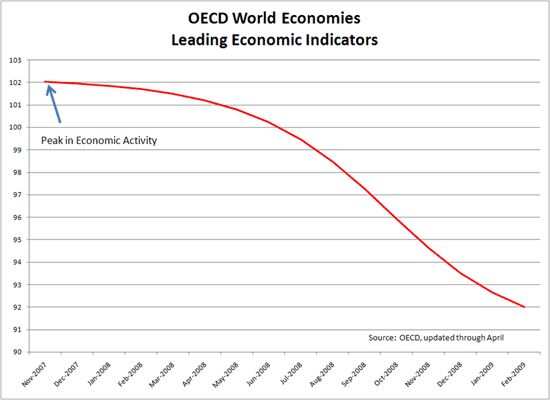European Union in Crisis as Financial & Economic Problems Multiply Threatening Euro Stability
Economics / Euro-Zone Apr 25, 2009 - 07:40 PM GMT Bryan Rich writes: The IMF released its Global Financial Stability Report this week. And it’s projecting total losses from the global financial crisis to reach $4.1 TRILLION. That’s four times the amount projected in last year’s report.
Bryan Rich writes: The IMF released its Global Financial Stability Report this week. And it’s projecting total losses from the global financial crisis to reach $4.1 TRILLION. That’s four times the amount projected in last year’s report.
Meanwhile, the only indicator improving across the globe seems to be tied to confidence. Stock values have climbed, and with it, so has confidence. But the hard data, the real underpinnings of global economies, are going the opposite direction. And the IMF agrees:
“The global financial system remains under severe stress as the crisis broadens to include households, corporations, and the banking sectors in both advanced and emerging market countries. Shrinking economic activity has put further pressure on banks’ balance sheets as asset values continue to degrade, threatening their capital adequacy and further discouraging fresh lending. Thus, credit growth is slowing, and even turning negative, adding even more downward pressure on economic activity.”
—IMF, April 2009
Major Structural Problems Still Exist …
 |
| Stock values have climbed, and with it, so has confidence. But it’s going to take more than confidence to overcome the global economy’s problems. |
Consumer, investor and business confidence certainly have a powerful role in an economic recovery. But confidence alone can’t overpower the major structural problems still overhanging the global economy. The longer the structural problems exist, the faster confidence retreats. And the sharper the unsubstantiated rally in investor confidence, the sharper the next leg down in global asset values will be.
The Organization for Economic Cooperation and Development’s (OECD) latest report on world leading economic indicators shows that the growth cycle experienced another consecutive downtick. That’s the twenty-first consecutive month that leading economic indicators for world economies have declined since peaking in November of 2007.
And the OECD’s indicators continue to see world economies in a strong downtrend as shown in the chart below.
Both the IMF and the OECD expect economic growth for 2009 to be deeply negative, and the 2010 forecast is for roughly flat growth. That might be the least rosy projection for 2010. But based on the expert community’s track record during this crisis, I’d prefer to be on the other side of the bet that 2010 will bring recovery.

Remember … the official record on identifying the magnitude of problems, the reach of those problems and projecting recovery has been littered with underestimations, miss-steps, flawed theories, and empty optimism.
And now, the IMF is taking a hard line on the severity of the damage — the most aggressive public projection. Four times more aggressive to be exact.
If the IMF is right, we are nowhere near the bottom of this economic downturn. And there will be significantly more pain to be felt in the financial sector.
With that, there’s one region in the world that looks particularly vulnerable to negative surprises as the financial-led economic crisis extends and deepens …
Europe Is Up to Its Eyeballs in Problems
Of the $4.1 trillion in potential global write-downs, Europe (excluding the UK) is expected to suffer the largest share. The IMF projects Europe to get wacked with $1.1 trillion (or 39 percent of the total) of new losses. The U.S. is thought to be on the hook for another $1.05 trillion (37 percent).
As I pointed out in my March 7 Money and Markets column, Western European banks have dangerously high credit exposure to their neighboring emerging market economies.
Then there was more bad news out of Europe this week: Deflation.
And it’s widespread …
![]() Spain, the fifth largest economy in the European Union, reported a fall in consumer prices for the first time in 50 years.
Spain, the fifth largest economy in the European Union, reported a fall in consumer prices for the first time in 50 years.
![]() The UK reported the first annual fall in retail prices since 1960.
The UK reported the first annual fall in retail prices since 1960.
![]() Ireland experienced its first drop in consumer prices since joining the euro in 1999.
Ireland experienced its first drop in consumer prices since joining the euro in 1999.
![]() Germany’s wholesale prices dropped the most in 22 years.
Germany’s wholesale prices dropped the most in 22 years.
![]() And Switzerland is so concerned about deflation that its central bank has intervened in the currency markets to weaken its own currency and has begun buying up its own debt to increase the supply of Swiss francs.
And Switzerland is so concerned about deflation that its central bank has intervened in the currency markets to weaken its own currency and has begun buying up its own debt to increase the supply of Swiss francs.
But deflation is not a problem confined to Europe. Deflation is a global problem …
Broad commodity prices are down 54 percent since July of last year. U.S. consumer prices declined year over year for the first time since 1955. The Baltic Dry Index (the cost of shipping raw materials around the world) has lost a colossal 84 percent of its value in less than a year. And producer prices, wholesale prices … all have trended lower and have now hit sub-zero levels in most major countries.
Fortunately for the U.S …
Fed Chairman Ben Bernanke is well studied on historical episodes of deflation and has taken out the entire toolbox to fight off a destructive downward spiral in prices. In fact, he wrote a speech on it. And it was before he ever walked the halls as the Fed Chairman.
 |
| “Under a paper money system, a determined government can always generate higher spending and hence positive inflation.” —Fed Governor Bernanke, 2002 |
In 2002, then Fed Governor Bernanke addressed the National Economists Club with his speech, Deflation: Making Sure “It” Doesn’t Happen Here. And his 2002 speech reads like the Fed’s playbook for the current recession.
Back then, Bernanke pointed to the dangers of deflation taking a foothold on an economy. He spoke about the destructive effects deflation has on outstanding debt.
We can see this by looking at the Great Depression when the United States experienced three consecutive years of falling prices to the tune of roughly 10 percent a year. Consider what that means for someone who borrows money at 5 percent interest. It’s like they actually took out a loan at 15 percent interest!
This ever-increasing real value of debt makes debt prohibitively unaffordable and puts the brakes on any new demand for debt. This creates a vicious cycle that further weakens consumption and feeds into a spiral of more deflation and more contraction in the economy.
But not to worry, Bernanke has his playbook. And in the playbook you’ll find what play to run when the Fed has already cut short term rates down to zero — the traditional policy action to fight deflation.
In contrast to the times of the Great Depression, the dollar is no longer on the gold standard. So today, the dollar is just a piece of paper. And that means the government can print more and more and more money until the value of goods and services begins to climb against the value of a dollar.
A key point in Bernanke’s paper: “Under a paper money system, a determined government can always generate higher spending and hence positive inflation.”
And this is where Europe, and in particular members of the single currency (the euro), face a challenge … The European Central Bank has been slow and hesitant to keep moving interest rates toward the zero line. And, there is great disagreement about whether or not — if and when — to turn on the ‘printing press.’
What Are the Competitors Doing?
The U.S., the UK, Japan, and Switzerland have all opened up the arsenal on both declining GDP and deflation. Yet ECB officials are still mulling it over. And they, in fact, have the most difficult challenge with the lack of economic continuity within the union.
The ECB seems to be making a bet with no middle ground. If their policy choices prove wrong, the result could be the complete dismantling of the EU and the common currency. If they prove to be right, then we will have plenty of currencies to buy euros against.
Regards,
Bryan
This investment news is brought to you by Money and Markets . Money and Markets is a free daily investment newsletter from Martin D. Weiss and Weiss Research analysts offering the latest investing news and financial insights for the stock market, including tips and advice on investing in gold, energy and oil. Dr. Weiss is a leader in the fields of investing, interest rates, financial safety and economic forecasting. To view archives or subscribe, visit http://www.moneyandmarkets.com .
Money and Markets Archive |
© 2005-2022 http://www.MarketOracle.co.uk - The Market Oracle is a FREE Daily Financial Markets Analysis & Forecasting online publication.



